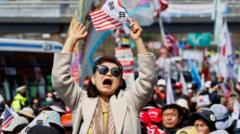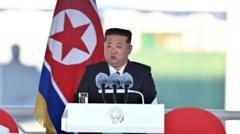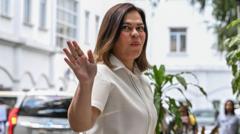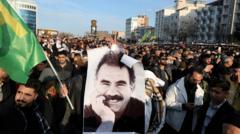A unanimous Constitutional Court ruling has ousted President Yoon Suk Yeol, setting the stage for an impending electoral shift and raising questions about the country's political future.
South Korea Faces New Era After President Yoon's Impeachment

South Korea Faces New Era After President Yoon's Impeachment
South Korean court's ruling signals a pivotal change in the nation's political landscape
In a historic decision, South Korea's Constitutional Court has unanimously upheld the impeachment of President Yoon Suk Yeol, who was removed from office following his controversial attempt to impose martial law. The court's ruling, delivered after a tense waiting period, sparked a wave of emotions across Seoul, as supporters and critics alike reacted to the verdict. A snap election to select Yoon's successor must be conducted by June 3, and the political ramifications of this ruling will be felt in the weeks ahead.
Yoon's presidency was marred by a series of controversies, culminating in his military takeover of parliament last December, an act that shocked the nation and evoked memories of South Korea's dictatorial past. His brief martial law—a mere six-hour ordeal—was received with a national outcry, marking a turning point in public sentiment. Many South Koreans now express deep-rooted fears over the potential resurgence of such authoritarian measures in the future.
Following the ruling, public reaction varied, from jubilation among Yoon’s detractors to disappointment among his supporters, illustrating a nation profoundly divided. The Constitutional Court criticized Yoon's actions harshly, and court president Moon Hyung-bae noted that his attempt at authoritarian rule hurt the very fundamental rights he was sworn to protect. This decision has sparked discussions on potential constitutional reforms to avert similar situations in the future, although any changes face significant political hurdles.
The political landscape in South Korea has never been more polarized, with Yoon's remarks about "anti-state forces" spurring a rise in conspiracy theories and far-right activism. Public trust in governmental institutions is at an all-time low, with recent polls indicating that significant portions of the electorate doubt both the integrity of the voting system and the motivations of the Constitutional Court. As the nation braces for an election, fears grow that dissent may escalate further rather than abate.
While Yoon's political party has accepted the court's decision, he himself maintains a defiant stance, claiming that he has been wronged. He has issued an apologetic statement to his supporters, yet his refusal to concede gracefully raises concerns about continued unrest. The power vacuum created by his removal is sure to challenge South Korea's political stability, especially as the nation faces external pressures from international relationships and looming trade negotiations.
As South Korea heads toward an essential election in a climate of distrust and division, the need for a unifying leader who can bridge political gaps and guide the country forward has never been more pressing. With the eyes of the world on Seoul, the unfolding saga of Yoon Suk Yeol and his unprecedented impeachment will continue to shape the electoral dynamics of this resilient democracy.





















